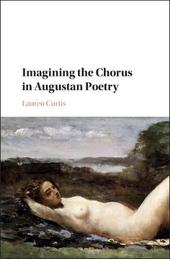
|
Imagining the Chorus in Augustan Poetry
Hardback
Main Details
| Title |
Imagining the Chorus in Augustan Poetry
|
| Authors and Contributors |
By (author) Lauren Curtis
|
| Physical Properties |
| Format:Hardback | | Pages:282 | | Dimensions(mm): Height 235,Width 158 |
|
| Category/Genre | Poetry anthologies |
|---|
| ISBN/Barcode |
9781107188785
|
| Classifications | Dewey:871.0109 |
|---|
| Audience | | Professional & Vocational | | Undergraduate | |
|---|
| Illustrations |
Worked examples or Exercises
|
|
Publishing Details |
| Publisher |
Cambridge University Press
|
| Imprint |
Cambridge University Press
|
| Publication Date |
14 September 2017 |
| Publication Country |
United Kingdom
|
Description
From archaic Sparta to classical Athens the chorus was a pervasive feature of Greek social and cultural life. Until now, however, its reception in Roman literature and culture has been little appreciated. This book examines how the chorus is reimagined in a brief but crucial period in the history of Latin literature, the early Augustan period from 30 to 10 BCE. It argues that in the work of Horace, Virgil, and Propertius, the language and imagery of the chorus articulate some of their most pressing concerns surrounding social and literary belonging in a rapidly changing Roman world. By re-examining seminal Roman texts such as Horace's Odes and Virgil's Aeneid from this fresh perspective, the book connects the history of musical culture with Augustan poetry's interrogation of fundamental questions surrounding the relationship between individual and community, poet and audience, performance and writing, Greek and Roman, and tradition and innovation.
Author Biography
Lauren Curtis is Assistant Professor of Classical Studies at Bard College, New York. Her research focuses on Augustan poetry, especially its engagement with music and performance, book culture, antiquarianism, and cultural memory. Recent and forthcoming publications include articles on the aetiological poetics of Ovid's Tristia, the representation of Arion and his lyre in Hellenistic and Augustan poetry, and epiphany in Latin love elegy.
|